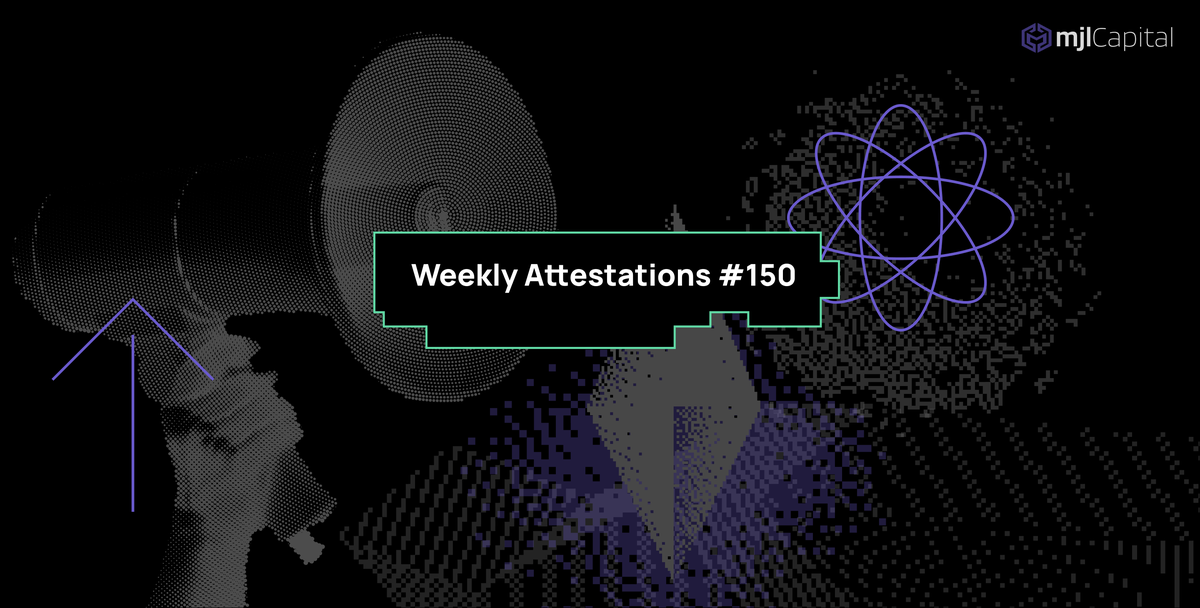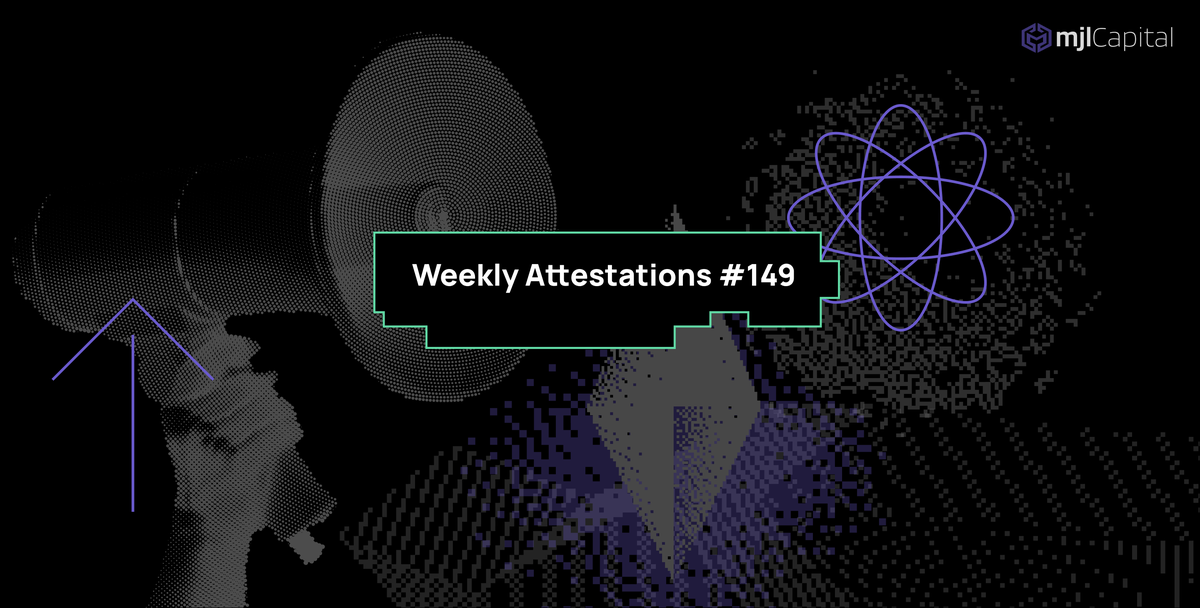Token Specific News
Eigen(Layer) On The Prize
EigenLayer has officially launched on the Ethereum mainnet, introducing a pioneering restaking protocol that enables users to maximize yield and utility of ETH. Following successful testing on testnets, EigenLayer's mainnet debut has attracted over 4.1 million staked ETH, with 70% of new Ethereum validators opting to restake on the platform. The launch brings forth new features, including stake delegation to 200 Operators offering Actively Validated Services (AVS), such as AltLayer's MACH restaked rollups and Brevis's Coprocessor. These AVSs enhance Ethereum's ecosystem by providing functionalities like light client functionality, real-world data integration, and fast computing. EigenLayer's mainnet launch signals significant inflows of capital, with $500 million in delegated stake within the first 24 hours, and notable partnerships with major operators like Coinbase developer platform, Google Cloud, and Blockdaemon.

Source: DefiLlama
More on Restaking (but... different)
Restaking protocols, including liquid restaking protocols, are playing a crucial role in the Ethereum ecosystem, with over $8 billion locked across these platforms. These protocols utilize EigenLayer for restaking while providing users with liquid restaking tokens, granting access to their funds while secured. Besides increased yield potential, there's airdrop potential from both EigenLayer and liquid restaking protocols like ether.fi. The trend of restaking is gaining traction, with over 40% of new validator nods opting for restaking on the Ethereum Beaconchain since March 23rd. This popularity surge is evident across all validator entities, with about one-quarter now engaging in restaking, compared to just 2% at the start of 2024. Although it's still early for restaking overall, the concept has gained significant momentum. Despite temporary limitations on liquid staking token deposits in EigenLayer, the rise of restaking success signals promising growth prospects for the future. See Similar: LRTs Surge To Record Dominance Over Restaking Sector

Source: The Block
Memecoins Drive Record Monthly DEX Trading Volumes
In March, decentralized exchanges (DEXs) experienced an unprecedented surge in trading activity, reaching a historic high of $261 billion in transaction volume, surpassing the previous peak in November 2021 by nearly $25 billion. Memecoin trading played a significant role in this surge, particularly on platforms like Ethereum, Solana, and Binance Smart Chain (BSC). Notably, Coinbase's Layer 2 network, Base, emerged as a notable player in memecoin trading, attracting attention with a transaction volume of $7.75 billion in March. Base's memecoin market capitalization skyrocketed by 477%, reflecting the growing interest in memecoins within the crypto community. Amidst this surge, Base's transaction fees spiked, prompting efforts to address scalability challenges. Traders are witnessing a rotation from Solana to Base, signaling potential for further excitement and volatility in the memecoin market. See more: Vitalik Buterin and Arthur Hayes Weigh In On Memecoin Frenzy
Ripple Announces Plans for USD-Pegged Stablecoin Amid Growing Market While PayPal Goes International
Ripple has unveiled plans to introduce a USD-pegged stablecoin, slated for availability on the XRP Ledger and Ethereum blockchain. Backed by USD deposits, short-term U.S. government treasuries, and other cash equivalents, the stablecoin aims to tap into institutional and DeFi use cases across various ecosystems. With audits conducted by a third-party accounting firm, Ripple aims to compete with leading stablecoins like USDT and USDC, targeting a projected market growth to $2.8 trillion by 2028. Despite legal challenges, Ripple remains committed to compliance, eyeing a launch later this year. Meanwhile, PayPal has announced the availability of its PYUSD stablecoin for international payments for U.S. customers.
Bots Spam Better Than Humans
Despite its recent surge in popularity and market cap, Solana encountered significant congestion issues on April 4, with over 75% of transactions proving unsuccessful, surpassing the previous day's record of 70%. The network's fixed transaction cost has led to ongoing spamming by bots, exacerbating congestion problems. While SOL, Solana's native token, has experienced remarkable growth, recent network issues, coupled with the introduction of a Bitcoin-like mining protocol called Ore, have raised concerns about Solana's scalability and ability to handle increased demand. However, Solana's core contributors remain optimistic about addressing these challenges through updates such as priority fees, emphasizing the network's capacity for scalability despite current setbacks. See more: Solana Price Falls Amid Network Congestion as Wormhole Plunges After Airdrop

Source: Dune
SushiSwap Governance Proposal Sparks Controversy Over Treasury Asset Transfer
A governance proposal within SushiSwap suggests transferring DAO-controlled treasury assets to a new vault managed by Sushi Labs, aimed at enhancing operational efficiency. The proposal, presented by SushiSwap developer Jiro, requests a grant of 25 million Sushi tokens to Sushi Labs, encompassing various assets including those from the Arbitrum airdrop, business development grants, and more. This move, which would consolidate operational responsibility for core product development under Sushi Labs, has sparked controversy, with concerns raised about shifting focus from decentralized protocol governance to a more centralized structure. Despite facing strong opposition, the proposal is part of what SushiSwap "Head Chef" Jared Grey considers necessary restructuring, although preliminary voting indicates majority resistance to the transfer. See similar: Aave Reduces MakerDAO's DAI Collateral After Proposal to Completely Eliminate It
Regulation
SEC Seeks Feedback on Three Proposed Ethereum ETFs
The U.S. Securities and Exchange Commission (SEC) has initiated a public comment period on three proposed Ethereum exchange-traded funds (ETFs), marking a significant step forward for these anticipated investment products. Grayscale Investments, Fidelity, and Bitwise are among the fund managers subject to the three-week comment period. These managers have proposed spot Ethereum ETFs, intending to hold ETH and issue shares that mirror its price. This move follows the SEC's approval of 11 spot Bitcoin ETFs in January, which have seen substantial popularity and inflows. While some analysts previously anticipated SEC approval for ETH ETFs by May, recent assessments suggest a delay may be more likely, potentially beneficial in creating space between Bitcoin and Ethereum ETF approvals.
SEC Issues Wells Notice to Uniswap, Stirring Regulatory Concerns
The United States Securities and Exchange Commission (SEC) has issued a Wells notice to Uniswap, the decentralized exchange facilitating automated token exchanges on Ethereum. Uniswap's chief legal officer, Marvin Ammori, confirmed the notice, expressing disappointment but not surprise. Uniswap Labs, the main developer behind Uniswap, has been under SEC investigation since 2021. Despite Uniswap's claims of being solely a software developer, separate from the autonomous Uniswap protocol, regulatory pressure has intensified. As the U.S. SEC escalates legal action against crypto platforms, the European Union is advancing regulations under the Markets in Crypto-Assets (MiCA) framework, addressing decentralized finance protocols.
Sony Bank Pilots Stablecoin Initiative on Polygon Blockchain
Sony Bank, the banking arm of the Japanese entertainment conglomerate, is embarking on a stablecoin initiative on the Polygon blockchain. The project aims to develop a stablecoin pegged to fiat currency, primarily the Japanese yen, to streamline payment systems across Sony's gaming and sports intellectual properties. Led by Belgium-based blockchain firm SettleMint, the pilot will also assess legal considerations surrounding yen-backed stablecoins. This move aligns with Sony Group's broader foray into web3 technology, including NFT adoption in gaming and collaboration on a public blockchain network with Astar Network's developers.
Advancements in Tokenization: Recent Projects and Initiatives
Tokenization is gaining traction as the future of markets, with significant developments paving the way for mass adoption. The Bank for International Settlements (BIS) initiated Project Agorá to explore tokenizing assets in collaboration with several central banks, aiming to bridge tokenized wholesale money with commercial bank deposits. Additionally, the BIS is working on Project Promissa with the Swiss National Bank and the World Bank to develop a tokenized promissory note platform. HSBC introduced a tokenized gold product for its Hong Kong customers, marking the first bank-backed tokenized gold offering, albeit with limited trading capabilities. Furthermore, BlackRock's collaboration with Securitize to launch the USD Institutional Digital Liquidity Fund (BUIDL), backed by $100 million in seed funding, signals significant institutional interest in tokenization investments. These initiatives reflect growing momentum toward unlocking the potential of tokenization in various sectors.
Insights into Q1 Crypto Fundraising Trends
In Q1, crypto fundraising volume saw a 23% decrease quarter-over-quarter, largely attributed to a significant fundraising spike in November of the previous quarter. However, early-stage deal volume and count surged by 73% and 53% respectively, indicating a strong interest in new projects during the bullish market. Top deals included Eigen Labs, Hashkey Group, Optimism, Freechat, and Zama, with finance, networks, and infrastructure dominating fundraising. Notably, Optimism's Ethereum Layer-2 solution raised $89 million in a private token sale, facing challenges in Layer-2 UX but benefiting from Ethereum's network upgrades. Zama's cryptography solutions garnered $73 million, offering potential benefits in data privacy despite adoption hurdles. The quarter also witnessed growth in modular infrastructure projects like Eclipse Labs and 0G Labs, presenting opportunities for scalability and innovation, albeit with uncertainties in market adoption and differentiation. See more: Monad Labs Raises $225M in This Year’s Biggest Funding Round

Source: Messari
Terraform Labs and Co-founder Found Liable for $40 Billion Civil Fraud
A U.S. court has ruled against Terraform Labs and its co-founder Do Kwon, holding them liable for $40 billion in civil fraud, following a unanimous jury verdict. The collapse of the Terra network and its algorithmic stablecoin UST in May 2022 had a significant impact, leading to a downturn in the crypto markets and triggering contagion risks that resulted in billions worth of CeFi insolvencies in subsequent months. See more: Montenegro Supreme Court overturns decision on Do Kwon's extradition as NY civil case continues
Other Domestic Regulation Updates
- Coinbase class action lawsuit gets partial revival
- DeFi in Court: Jury to Decide if “Code Is Law” in Mango Markets Trial
- U.S. Treasury Presses Congress for Powers to Sanction Foreign Crypto Exchanges
- Google Sues Developers Over 87 Fraudulent Crypto Apps on Google Play
- JPMorgan says Ethereum could avoid 'security' label amid decreasing Lido share
Other International Regulation Updates
- Binance executive Tigran Gambaryan transferred to an underground jail cell as Nigerian crisis escalates
- Top Chinese Asset Managers Apply for ETFs via Hong Kong Subsidiaries
Pain & Gain
Pain
- Binance says no more to Bitcoin NFTs despite steady momentum
- MakerDAO Founder Says Having “Rando’s” Participate in Governance Makes DAOs Unpredictable
- dYdX Chain resumes block production after 9.5 hour halt
Gain
- Bitcoin Ordinals Driving ‘Renaissance’ in BTC Activity: Franklin Templeton
- Stepn airdropping points worth $30 million of GMT tokens
- Solana DEX Zeta Markets set to airdrop 100 million Z tokens
- Frax Stakers On Track To Earn $20.8M Annually After Fee Switch Activation
- Coachella Launching Avalanche NFT Quests Game at Music Festival
- Pixel Vault’s 'BattlePlan' Migrating to Ethereum Gaming Network Xai
Important Legal Notices
This reflects the views MJL Capital LLC (“MJL”), but it should in no way be construed to represent financial or investment advice. Nothing in this correspondence is intended to constitute or form part of, and should not be construed as, an issue for sale or subscription of, or solicitation of any offer or invitation to subscribe for, underwrite, or otherwise acquire or dispose of any security, including any interest in any private investment fund managed by MJL. Any such offer may only be made pursuant to a formal confidential private placement memorandum of any such fund, which may be furnished to potential investors upon request and which will contain important information to be considered in connection with any such investment, including risk factors associated with making any investment in any such fund. Further, nothing in this correspondence is, or is intended to be treated as, investment or tax advice. Each recipient should consult their own legal, tax and other professional advisors in connection with investment decisions.
Domenic Salvo is a Managing Partner at MJL Capital, helping lead Portfolio Research and Investor Relations.




